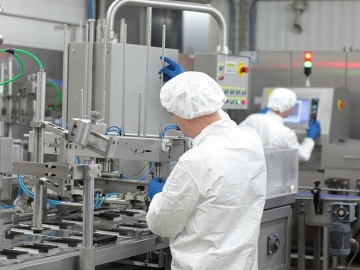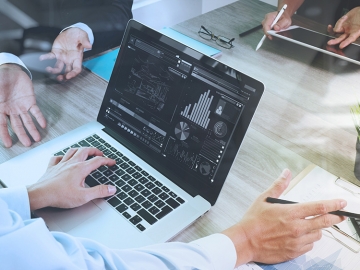Industrial Manufacturing

For the company’s manufacturing materials, semi-finished products and end products, regardless their type, TotalSoft has developed and provided the solution Charisma for Manufacturing, a set of modules specific to the industrial and agricultural manufacturing, perfectly integrated to Charisma ERP. Its features cover many types of manufacturing businesses, such as:
- Manufacturing by project (one-time products) – specific to the naval shipyards or industrial construction companies;
- Manufacturing by technology specialised business unit (Work Shop) – specific to the manufacturing by small and average internal orders, by technology specialised business units, such as the equipment or furniture manufacturing;
- Production by flow (Work Flow) –specific to the average and big manufacturing, by technology sequential phases on a linear flow, such as the food, chemical or plastics industry;
Benefits
- Reduces manufacturing time by product/order through native integration with the solution for manufacturing resource planning;
- Reduces manufacturing costs and optimises the supply activity;
- Increases the efficiency of the manufacturing process by planning the manufacturing process according to customer orders, manufacturing capacities, as well as proven performance, the reporting of the performed or ongoing manufacturing, waste management and quality assurance.
- Optimises manufacturing time by identifying delays on time, permanent tracking and control;
- Increases the performance of the team directly involved in the manufacturing process, thanks to the deeper understanding of the role and duties of the jobs by the company's employees;
Manufacturing Launching and Tracking (Core) module, with the submodules:
- Manufacturing Preparing (Launching – Technologies);
- Manufacturing Tracking (Manufacturing and Control Reporting) – recording the information related to the quantitative and qualitative reporting for the completed production;
- Strategic Tracking (Pre-calculation and Post-calculation) – recording the financial information related to manufacturing;
Production planning module, with the submodules:
- Strategic Planning (MPS – Master Plan System);
- Production Planning (MRP – Material Requirement Planning);
- Production Scheduling (MES – Manufacturing Execution Scheduling);
Each project is a unique implementation, depending on the manufacturing type, the business requirements and the manufacturing reporting hardware platform (client workstation, touch screen, mobile device).
Architecture
By following the manufacturing workflow phases, the solution allows recording data related to:
- Manufacturing planning
- Orders and work orders launching
- Execution technologies
- Manufacturing tracking
- Directly and indirectly recording and allocating the costs at cost centre level or calculating the profitability at cost centre level.
Features
- Tracks manufacturing by various dimensions and the orders during the manufacturing phases;
- Defines and efficiently tracks the technology structure – the company’s technology entities (technology groups depending on the technology operations systematically executed by technology phase for obtaining the semi-finished products and end products), capacities and manufacturing capabilities;
- Defines the products and the used technologies – hierarchically defines the products/projects (product/project hierarchy structure), defines the specific operations at each node level in the hierarchy structure (subassembly/project activity), standardizes the required execution times for each operation (preparation times, execution times, idle times, transportation times);
- In pre-calculation, calculates the pre-calculated cost of an offered or ordered product, based on the raw costs standardised in the technology (raw material, labour, equipment costs), overhead percentages set ad manufacturing department level and a hierarchy calculation model. The pre-calculated cost (hierarchically consolidated) is detailed by value at section overhead cost level, administrative overhead cost, pre/calculated profit quota, sales price, in a primary currency (RON) and a secondary currency (e.g. EUR, USD).
- Fully plans the manufacturing process by defining the manufacturing plans at various management levels, based on the sales plan, the estimated or firm customer orders;
- Allows recording the actual manufacturing or ongoing manufacturing, waste management and quality assurance.
- Tracks the manufacturing related costs by the allocation dimension with various meanings (order, product, product group, manufacturing sections, equipment, expense type/calculation item);
- In post-calculation, calculates the raw and burden costs at the end of the accounting period (month) (by section, enterprise) at direct cost centre level (order, product) and calculation item (expense type: labour, raw material, material, depreciation, services, etc.); the burden costs are allocated from the indirect cost centres (sections, auxiliary departments, administrative) to the direct cost centres in multiple steps, based on configurable allocation keys;
- Allows multiple profitability analysis at accounting period and direct cost centre level (order, product), depending on the specific manufacturing type:
- Pre-calculation – post-calculation comparison – detailed verification at direct cost centre level (order, product) and calculation item, of the pre-calculated costs (based on the standardised consumption of raw material and resources such as personnel, equipment) versus the actual costs (based on the expense documents affecting the balance sheet class 6);
- Revenue – Expense comparison – checking at direct cost centre level (order, product) the actual revenue (based on the revenue documents affecting the balance sheet class 7), of the direct expenses (based on the expense documents affecting the balance sheet class 6) and overhead (allocated during the post-calculation) and the actual profit (calculated as the difference between the actual revenue and the actual expenses (direct and overhead);
- Chronological comparison of the actual unit costs (by-product unit) in case of mass production – checking at direct cost centre level (product) of the actual unit cost related to an accounting period, having the possibility to compare to the values recorded during the previous periods, details of calculation items;
- Allows management accounting treatment (management accounting class 9) in the case of manufacturing type by project/orders, by automatically generating class 9 accounting notes, based on the post-calculation:
- Recording the values in the core documents to the 921 account;
- Recording the expense document values related to the section overhead (allocated by post-calculation during the corresponding steps) to the 923 account;
- Recording the expense document values related to the enterprise overhead (allocated by post-calculation during the corresponding steps) to the 924 account;
- Closing the management accounting balance sheet by calculating the values related to the goods production and unfinished production.




